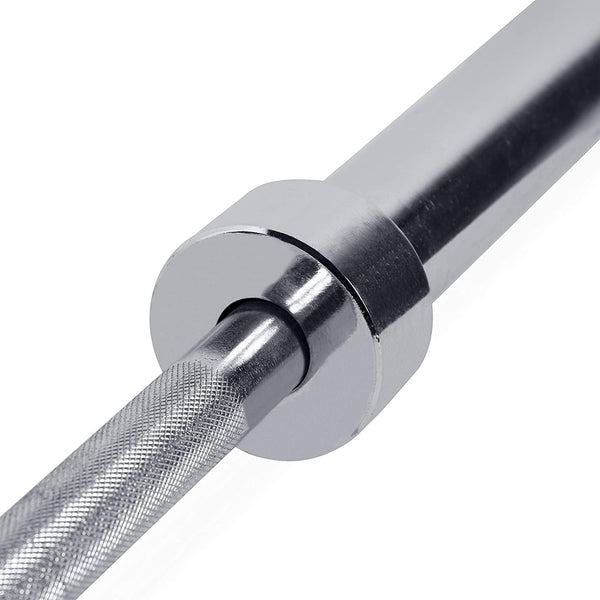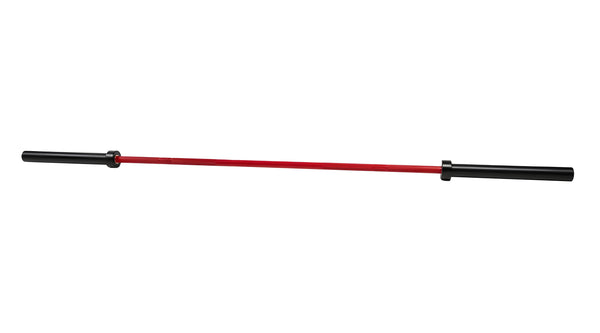Your Cart is Empty
January 06, 2024 3 min read
Powerlifting with barbells is an incredibly effective way to get stronger, build muscle, and increase your overall athletic performance. Barbells are one of the most popular pieces of fitness equipment used by weightlifters and powerlifters alike because they provide a wide range of exercises that can be done to target different muscle groups.
Shop The Collection: BarbellsBarbells come in various sizes and weights, allowing for a variety of exercises to be performed with them. With barbells, you can do traditional lifts such as squats, deadlifts, bench presses, overhead presses, and more. You can also use them for isolation exercises such as bicep curls, triceps extensions, and shoulder presses. Barbells also allow you to perform complex movements such as Olympic lifts and power cleans.
 Shop The Gear: CAP Barbell Olympic Solid Bar, 5-ft, from $63.99 USD
Shop The Gear: CAP Barbell Olympic Solid Bar, 5-ft, from $63.99 USD
When it comes to choosing the right barbell for powerlifting, there are several different types to choose from. The type of barbell you should choose depends on what your goals are and how experienced you are with weightlifting. For beginners, it is recommended to start with an Olympic barbell. This type of barbell is typically 7 feet long and has a diameter of 28-29 millimeters. It also has collars on the ends and knurling in the middle, which helps prevent your hands from slipping off during exercises.
Shop The Collection: Weight PlatesFor more experienced lifters, there are other types of barbells available as well. These include powerlifting barbells, specialty barbells, and more. Powerlifting barbells are often thicker and longer than Olympic barbells, usually measuring 8 feet in length. They also tend to have more knurling, which helps with grip strength when lifting heavier weights.
 Shop The Gear: COREFX Cerakote Olympic Barbell, $322.99 USD
Shop The Gear: COREFX Cerakote Olympic Barbell, $322.99 USD
Specialty barbells are designed for specific exercises, such as trap bars for deadlifts and Swiss bars for press variations. Trap bars are hexagonal-shaped barbells with handles located at each end. Swiss bars are similar to standard barbells but have multiple grip options, making them ideal for doing presses or other exercises that require you to hold the bar in a certain way. Finally, there are also specialty bars such as cambered bars and safety squat bars, which are designed to reduce stress on the lower back while performing certain exercises.
There are many benefits to powerlifting with barbells. For starters, barbells offer a wide range of exercises, allowing you to target different muscle groups. Barbells are also very versatile and can be used for both bodyweight and free weight exercises. Additionally, because barbells are usually much heavier than dumbbells, they help you build more strength and muscle mass quickly.
Barbells also offer a great deal of stability, which is essential for proper form and technique when lifting heavy weights. This stability allows you to lift heavier weights with confidence, as you don’t have to worry about the barbell moving or shifting while you’re lifting. Finally, barbells are relatively inexpensive compared to other pieces of fitness equipment, making them an excellent choice for people on a budget.
Before you start powerlifting with barbells, it’s important to understand proper form and technique. This will help ensure that you don’t injure yourself and get the most out of your workouts. Here are some tips for powerlifting with barbells:
Powerlifting with barbells is an incredibly effective way to get stronger and build muscle. Barbells are versatile and offer a wide range of exercises, making them a great choice for both beginner and experienced lifters. With proper form and technique, barbells can help you take your powerlifting to the next level.
Shipping Protection gives you peace of mind while saving you time and money.
Shipping Protection provides coverage for eligible orders that are lost or damaged in transit, or stolen after delivery has been confirmed by the carrier. MAGMA Fitness, through its partners, administers the protection program and may receive compensation for these services. Coverage is subject to the terms, conditions, and exclusions outlined in our Shipping Protection Terms & Conditions.